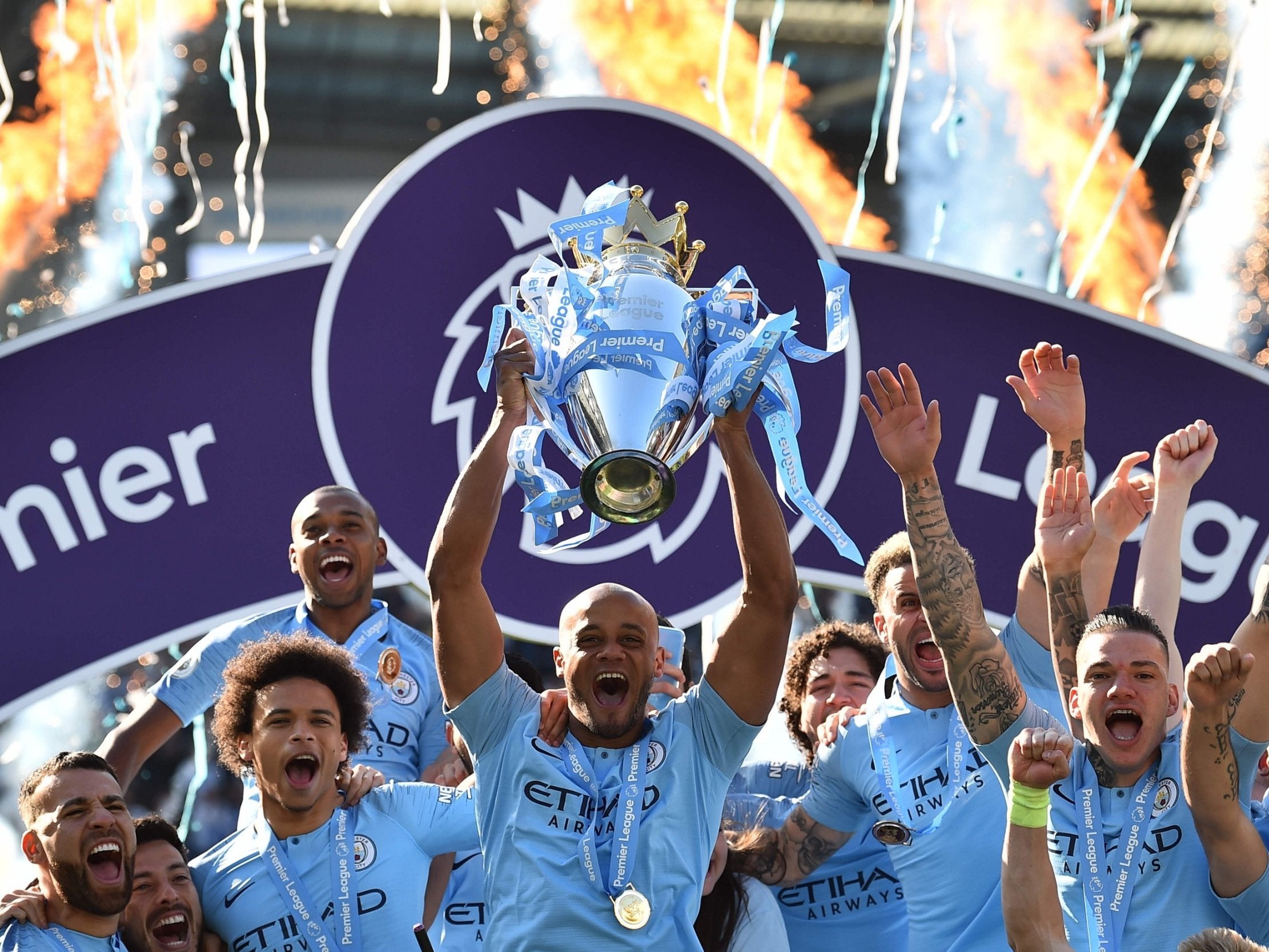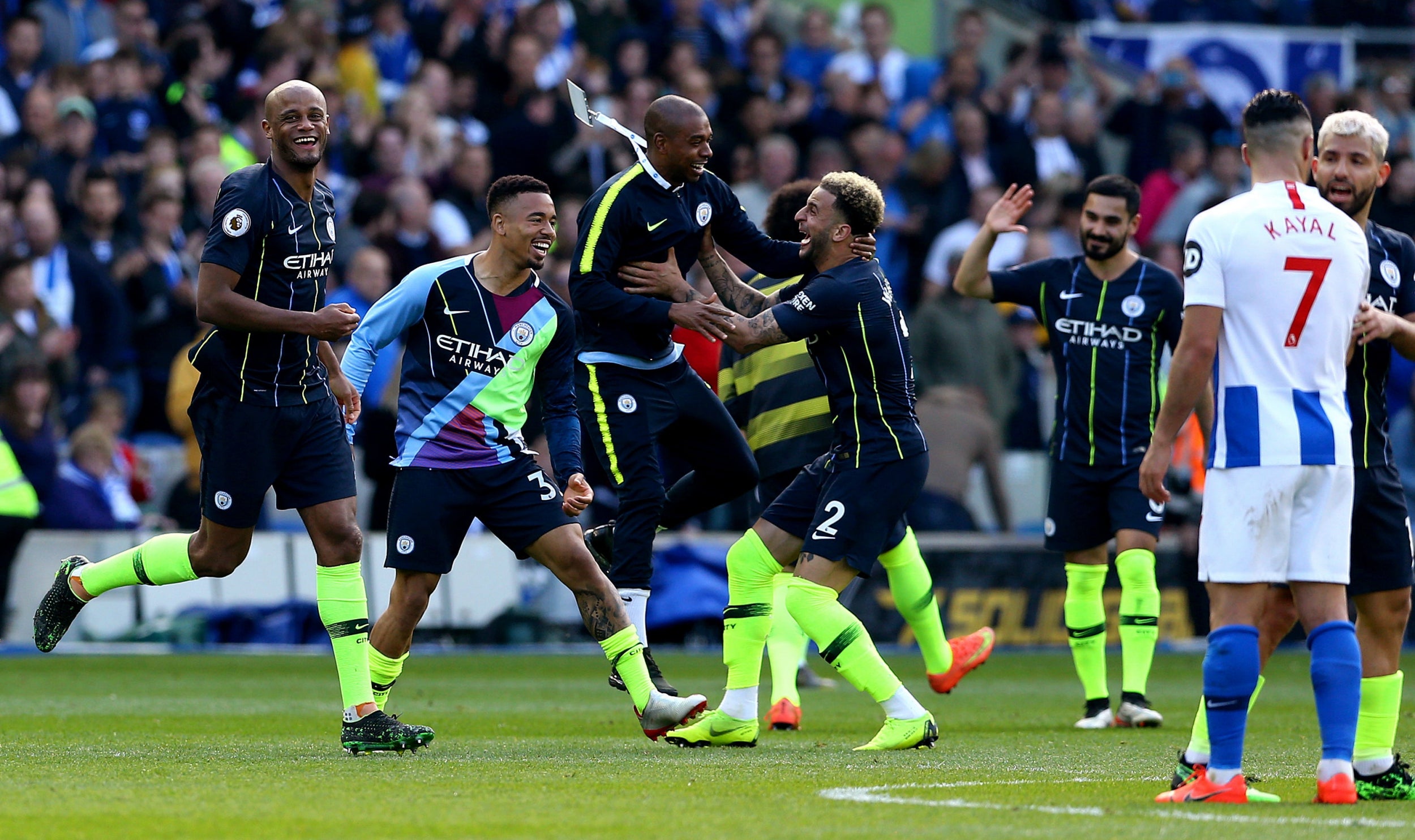Pep Guardiola inspires Man City to new heights to reconfigure the chemistry of entire Premier League
The Blues finished the season with 14 successive victories to demonstrate their mental fortitude and hold off Liverpool

Your support helps us to tell the story
From reproductive rights to climate change to Big Tech, The Independent is on the ground when the story is developing. Whether it's investigating the financials of Elon Musk's pro-Trump PAC or producing our latest documentary, 'The A Word', which shines a light on the American women fighting for reproductive rights, we know how important it is to parse out the facts from the messaging.
At such a critical moment in US history, we need reporters on the ground. Your donation allows us to keep sending journalists to speak to both sides of the story.
The Independent is trusted by Americans across the entire political spectrum. And unlike many other quality news outlets, we choose not to lock Americans out of our reporting and analysis with paywalls. We believe quality journalism should be available to everyone, paid for by those who can afford it.
Your support makes all the difference.As the Manchester City squad were in the dressing room raucously singing an imperfect rendition of Wonderwall with Noel Gallagher, cans of Budweiser and club-branded IPA strewn around the floor, Pep Guardiola was in the next room offering a perfect summation of this team’s influence.
“I think, honestly, we increased the standards of this competition last season,” the Catalan said, his winner’s medal around his neck, and a relaxed look finally on his face. “We did 100 points. Teams realised that, but only Liverpool handled it... they are the new standards of the Premier League and Liverpool helped us be there all the time. Now, to win the title, you have to win 14 games in a row. We knew for two months we couldn’t lose a point.”
And they didn’t. They always did the job once they knew they had to. City ended up producing the second longest streak of successive wins in the history of English football, after their own from last season, to claim a second successive title. That is the level.
There’s never been anything like it in English football. There’s similarly never been a lavishly-funded project like it in world football as a whole. That overwhelming advantage can’t be overlooked, nor can the four investigations to go with a potential three trophies.
There is the pending charge they have sought to unfairly accentuate even that advantage. Even without that, their power remains ominous for the Premier League.
What really elevates City, as Arsene Wenger has argued, is that combination of “money, intelligence and ideas”.
This near-perfect level of achievement is to a certain degree the inevitable consequence of this level of investment.
This isn’t to diminish Guardiola’s feat.
The Catalan is specifically why City’s achievement is so specially good. He is maybe the key part of that near-perfection, the focal point they were building towards. He best exemplifies their investment, since they just went out and got the best manager in the world. That is not just down to the distinctive philosophy of football they hope to instil the club with, but the way he has proven he can do this – get this extraordinary level of points – with any league. He will maximise whatever resources he is afforded.
At City, though, he has been afforded almost maximum possible resources for a football team – and an infrastructure that is optimally suited to how he works. It is as if they just have this critical mass of money, that leads to this mass of points.

This – best represented by Guardiola’s very appointment – is why they have amassed 198 points over two seasons, only dropping 30.
Some of this can be seen when you try and pick out other specific reasons why City are so good. It says much that it doesn’t feel like any of their players had the same individual effect as Virgil van Dijk, or Mohamed Salah. They haven’t had to.
Raheem Sterling did win the football writers’ player of the year to match Van Dijk’s PFA award, but some of that – as the very award indicates – felt as much to do with his influence on the media as on the game, even if he was often sensational. The England international’s goals were directly responsible for 12 points, which was one less than Sergio Aguero – and 12 less than Salah’s remarkable 24.

This is kind of the point. City, well, had multiple points of attack. Their forwards are relatively interchangeable. Even when some were more influential than others, the baton was almost consistently passed, along with the ball. Sterling would have a spell of prominence, then Leroy Sane, like with the crucial winner against Liverpool. Aguero would follow while Sane suddenly found himself on the bench more, before Bernardo Silva rose to become the most influential player at the most intense stage of the title race.
Hence Sane could eventually fall out of favour altogether, ready to be replaced by someone else. There’s always another City attacker coming. That must actually be what it feels like for opposition, as they create opportunity after opportunity, from overload after overload.
It says much that a player like Kevin De Bruyne isn’t even mentioned here, and that his long absences didn’t affect City’s ability to get 98-plus points.
They were able to weather even his injuries.
It says even more that a £60m signing like Riyad Mahrez could make a mere 14 starts. Liverpool didn’t have that available to them. It was in that sense almost symbolic that Mahrez scored that brilliant title-clinching goal. It wasn’t even the title-winning goal, since they were already in the lead through Aymeric Laporte, but instead the strike that gave them that extra layer of comfort. It went with that extra layer of quality; the extra depth.
Guardiola did actually touch on this in his post-match press conference, although when arguing that his squad doesn’t have a player that touches Salah’s influence.
“We don’t have one player who makes the difference or who scores 50 or 55 goals,” Guardiola acknowledges. “And so we have to do it as a team. That’s the secret. We pushed each other and I pushed myself. The only way we could do it was together.”
And, again, none of this is to diminish that. None of this is to say that City’s win was merely some mechanical combination of major external forces. It required inherent human qualities.
City’s resources did of course raise the level of the Premier League, as Guardiola himself argued, and that raised the level of Liverpool. The relentlessness of Liverpool in turn brought the best out of the champions, at least in a purely human sense.

They didn’t claim as many points as last season, when Guardiola’s entire football philosophy in this league was first vindicated, but did go much further in terms of resolve.
This is what Liverpool tested, pushing City’s mental resources to the limit. This is why City never “relaxed”, as Guardiola admitted he feared they might after the centurion season. Liverpool were now testing their pride, too. It sparked a resounding response, maybe in its own way more impressive than the 100 points. To win 14 successive games under the most intense pressure, and make that 18 victories out of 19 – a half a season – is immensely impressive no matter what way you look at it.
They couldn’t afford any slip, so didn’t slip. That itself came from Guardiola questioning their “will” – as Jurgen Klopp put it – as much as Liverpool. The Catalan was furious at the laxness of their last league defeat, the 2-1 to Newcastle United at the end of January, directly asking whether they cared enough. His half-hour excoriation ensured they never dropped below full commitment again.
This is just one way Guardiola has demonstrably maximised their resources, since it was his approach that so drove this. He has fostered this intense focus. He has created a singular unity of purpose, and a squad where there are no splits. He has set a pace, not least through his team meetings.
“Don’t expect Liverpool to lose,” he’d tell them. “Don’t expect favours. Don’t waste all the work you have put in.”
That never felt more acute than in the home match against Tottenham Hotspur, just days after the same club had so tempestuously eliminated them from the Champions League.
City were rattled, and the real danger was that work would be wasted; that they would squander the Premier League to go with the Champions League.
They didn’t. They held on. They won 1-0. They held their nerve. They stayed true to their approach, and stayed on course.
Guardiola had fostered just the right balance of competitive intensity; of nervous energy. It was why they could be so relentless, but so rarely reckless.
It is also why some of the fears about the extent of City’s dominance are exaggerated. Guardiola is a genuinely unique coach, and it is highly unlikely they will be able to replicate his return when they eventually have to replace him.

They may now be constructed to consistently get over 80 points for ever more, sure, but what really elevates City beyond that is Guardiola’s elusive quality.
The problem for everyone else is that it looks like he is going to be in Manchester for a while yet, and firmly believes the champions have some way to improve yet.
That’s because of one trait that remains intrinsic to Guardiola: “Winning is so addictive.”
He always wants more. He offers more than most can handle, even this Liverpool.
Guardiola has reconfigured the chemistry of the entire Premier League. Liverpool were the only side that rose to it. Only for City to just show they have more.
Join our commenting forum
Join thought-provoking conversations, follow other Independent readers and see their replies
0Comments